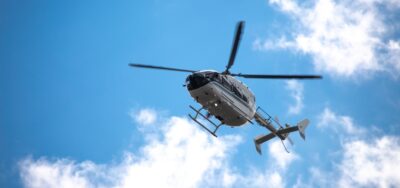
Government agencies, law enforcement, and independent experts are some of the parties that can investigate a helicopter crash, but several more entities may come on-site. After all, helicopter crashes are intricate events that necessitate the involvement of various parties to ensure a thorough investigation.
Each entity brings unique skills and resources to uncover the causes of the crash and recommend safety improvements. Here are the primary parties typically involved in investigating helicopter crashes. An Atlanta personal injury lawyer can answer your questions after an accident.
Government Agencies
National and regional government agencies are often the leading authorities in aviation accident investigations. These agencies oversee the investigation process, from initial response to final reporting. Their responsibilities include examining the crash site, collecting evidence, analyzing data, and issuing safety recommendations. Their goal is to improve helicopter safety and prevent future accidents.
Get the strong arm
Local Authorities
Local emergency services, including law enforcement, fire departments, and medical personnel, are often the first responders to a helicopter crash. They secure the crash site, provide immediate assistance to survivors, and may conduct preliminary investigations until specialized investigators arrive.
Independent Experts
Various independent experts may be called upon to contribute to the investigation. These can include aviation safety consultants, forensic analysts, and specialists in areas such as meteorology, engineering, and human factors. Their expertise provides additional insights that help piece together the sequence of events leading to the crash.
Aviation Regulatory Bodies
Regulatory bodies play a crucial role in ensuring that aviation operations comply with established safety standards. During an investigation, these bodies may assist in determining whether regulatory compliance was maintained before the crash. They provide expertise on aviation regulations and may enforce corrective actions based on investigation findings.
Helicopter Operators
The company or entity operating the helicopter also plays a significant role in the investigation. They supply operational data, maintenance records, and information about the flight crew. This information is vital for understanding the operational context and identifying any procedural shortcomings that might have led to the crash.
What Causes Helicopter Crashes?
Helicopter crashes, though less frequent than other types of aviation accidents, can be catastrophic due to the nature of their operations and environments. Identifying the causes of these crashes is crucial for enhancing safety measures and preventing future incidents. Here are the primary factors contributing to helicopter crashes:
- Mechanical failures: Engine failures, rotor malfunctions, and issues with hydraulic and avionics systems can lead to catastrophic crashes.
- Pilot error: Human factors such as fatigue, stress, and distractions, along with poor decision-making and inadequate training, contribute significantly to helicopter crashes.
- Environmental factors: Adverse weather conditions like fog, heavy rain, strong winds, and poor visibility due to smoke or darkness can create hazardous flying conditions.
- Operational factors: Poor maintenance practices, operational overload, and improper loading can all affect the helicopter’s performance and stability, leading to accidents.
- Bird strikes: Collisions with birds, especially at low altitudes, can damage critical components such as rotors and engines, potentially causing crashes.
- Air traffic control issues: Miscommunication or errors by air traffic controllers can lead to mid-air collisions or controlled flight into terrain incidents.
- Mid-air collisions: Helicopters often operate in environments with other aircraft, increasing the risk of collisions due to pilot error, poor visibility, or lack of situational awareness.
- Design flaws: Inherent design flaws in the helicopter’s structure or systems can contribute to accidents, sometimes only becoming apparent after the helicopter has been in service for some time.
Understanding these causes is essential for developing effective safety measures, improving pilot training, enhancing maintenance practices, and advancing helicopter design to reduce the incidence of helicopter crashes and enhance overall flight safety.
5 Steps to Take in the Event of a Helicopter Crash
Experiencing a helicopter crash is traumatic and requires immediate action. Here are five crucial steps to take:
- Ensure immediate safety: Check for injuries and apply basic first aid if possible. Evacuate to a safe distance if the helicopter is in a hazardous position. Avoid moving severely injured individuals unless there’s imminent danger.
- Call for help: Use a phone, radio, or emergency beacon to call for help and provide your location and crash details. Signal for assistance using visual or auditory signals if electronic communication is unavailable.
- Document the scene: If safe, take photos and videos of the crash site, injuries, and relevant details. Write down observations about the events leading up to the crash and the aftermath.
- Cooperate with authorities: Follow instructions from rescuers and emergency personnel. Provide accurate information to authorities to aid the investigation.
- Seek legal and medical assistance: Contact a lawyer who can handle aviation accidents for legal guidance. Get a thorough medical examination and follow any treatment plans. Notify your insurance company and provide them with documentation and evidence.
These steps ensure immediate safety, support a thorough investigation, and help secure necessary compensation and justice.
Contact Us if You or a Loved One Has Been Involved in a Helicopter Crash
If you or a loved one has been involved in a helicopter crash, it is crucial to seek professional assistance immediately. The aftermath of such an incident can be overwhelming, with numerous legal, medical, and financial challenges to navigate. If you’ve been in a wreck, call us to get The Strong Arm and to see why our clients have such glowing testimonials.
At John Foy & Associates, we are well-versed in providing comprehensive legal support to victims and their families in the wake of aviation accidents. Contact one of our attorneys to get support.
(404) 400-4000 or complete a Free Case Evaluation form





